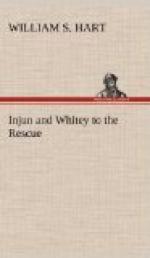He had plenty of time for these reflections and feelings, as Walt Lampson did not seem to be in a hurry about attending to Mr. Sherwood’s business, and Whitey caught Walt and the men looking at him in a peculiar way, when they thought he was not noticing them. On the third day after his arrival—an unpleasant, lowering day, for that time of the year, with a cold wind—Walt spoke thus to Whitey:
“I’m havin’ some stock cut out, t’day, t’ send to your dad. How’d ye like t’ go out on th’ range an’ take a look at it?”
“Is that the business Bill sent me on?” asked Whitey.
“Partly,” Walt answered. “What d’ye say? You might as well do that as loaf around here.”
“I’ll go,” said Whitey.
“All right. You c’n go with Hank Dawes. He’s startin’ pretty soon, an’ he’ll get you a hoss.”
It was some relief to Whitey to be galloping over the prairie, though Hank Dawes was not the man he would have chosen as a companion. Hank’s cruelty to his horse turned Whitey against him. Whitey had seen many animals treated unfeelingly, but he never could understand how a man could enjoy torturing one, as Hank seemed to. Finally, after an outburst on Hank’s part that included quirting and spurring and swearing, Whitey could hold in no longer.
“If you’d treat your horse better he’d behave better,” he said angrily. “You ought to know that.”
For a moment Hank looked blankly at Whitey, then burst out laughing. He could not understand any one’s having consideration for a horse, and the boy’s anger struck him as being funny. Whitey turned from him in disgust, baffled by such a lack of understanding and feeling.
The writer knows many men in the West, and, having been born and raised there, naturally thinks Westerners the finest men in the world. But for him to deny that there are good and bad among them would be idle. As idle to deny that some of them were cruel to their horses. Among these the Indians and Mexicans bear the worst reputations with those who are supposed to know. But, for the sake of truth, the author wishes to say that he found the Indians uniformly kind to their horses. And as for the Mexicans, not only were they always kind and considerate to their mounts, but they were among the greatest horsemen in the world.
Whitey and Hank rode for a time in a silence broken only by Hank’s occasional profane mutterings at his patient horse, then Whitey descried two objects moving toward him from the west. At first he mistook them for two horsemen, then discovered that one horse was being led, then that the rider was Injun, and the led horse was Monty. With a whoop of astonishment and joy Whitey galloped toward them.
“Hello, Injun, what’s all this?” yelled Whitey when within speaking distance, so glad that he was almost ready to embrace his friend.
Injun, as usual, showed no surprise, but there was a gleam of welcome in his eye. “Monty, him stolen,” he said. “Me find him.”




